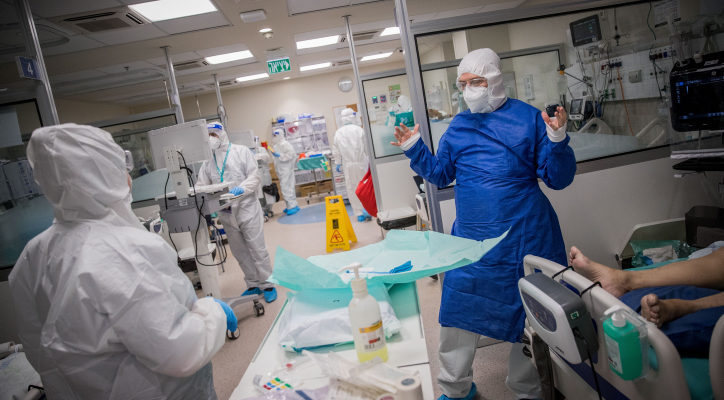Is the Israeli healthcare system really on the verge of collapse? It depends on who you ask.
By Lauren Marcus, World Israel News
During a televised speech on Sunday evening announcing a three week nationwide lockdown over the upcoming High Holidays, Prime Minister Benjamin Netanyahu cited the impending collapse of the Israeli healthcare system as justification for the closure.
“On Thursday, they [the healthcare system] raised a red flag,” he said.
“The system cannot withstand the projected number of serious cases and deaths if no action is taken in the coming weeks. The government is therefore taking preemptive action.”
But is the Israeli healthcare system really on the verge of collapse? It depends on who you ask.
Four hospital heads who spoke to government ministers on Sunday ahead of the lockdown vote expressed very different opinions about the necessity of a closure, reported Israel Hayom.
Professor Ofer Marin, the director of Jerusalem’s Sha’are Tzedek Medical Center, said that “the solution is not a lockdown tomorrow.”
His sentiments were echoed by Professor Arnon Afek, Deputy CEO of Sheba Hospital in Ramat Gan. “There is overcrowding in hospitals in the north and in Jerusalem, but in the center, we can receive patients,” he said.
“We are not close to the collapse of the healthcare system.”
Dr. Eitan Wertheim, CEO of Beilinson Hospital in Petah Tikvah, agreed with Afek and Marin, saying, “The trend [of corona patients] has changed since mid-August, but this is not a collapse. This is unnecessary panic and no full lockdown is required.”
Dr. Mickey Halberthal, director general of Haifa’s Rambam Hospital, was the sole hospital chief in favor of a lockdown. “I wouldn’t use the word collapse,” he said, “but the situation requires an immediate closure.”
With the highest year-round hospital occupancy rates of the OECD countries for years, Israel had issues with hospital overcrowding long before the coronavirus pandemic.
“There is no doubt the number of patients is increasing, and accordingly, the number of patients is difficult to manage,” Dr. Said Yunes, a senior physician in Hadera’s Hillel Yaffe Hospital infectious diseases ward, told Israel Hayom.
“But one of our main challenges is not that we just need to treat patients who are ill with the coronavirus – it’s that many of them have pre-existing conditions which we must also treat.”
“Our staff has to spend more and more time in the coronavirus ward, and when you’re wearing a protective suit, mask, and gloves, it’s not easy, to say the least.”
Dr. Yunes told Israel Hayom that the opening of a second coronavirus ward in the hospital “came at the expense of an internal ward, which in turn created an additional burden to the already existing internal wards. If morbidity continues to climb, it will be impossible to avoid a collapse here.”
The deputy director of Kaplan Hospital in Rehovot, Dr. Eitan Lavon, expressed support for the lockdown to Israel Hayom. “If the state of Israel wants to continue to allow the health system to effectively deal with the pandemic, lockdown is an inevitable step,” he said.
“The growing rise in morbidity, which is expected to increase significantly in the upcoming winter season, could lead to the collapse of other wards in hospitals, both due to the constant staff turnover and the maneuvering of resources and skilled manpower away from other departments in favor of coronavirus wards.”
“Only immediate action can cut the chain of infection, lighten the load on the emergency rooms, internal medicine departments, primary care clinics in the community and on the health system as a whole,” Lavon said.
Dr. Halberthal, the lone voice in favor of the lockdown who spoke at Sunday’s cabinet meeting, said he was satisfied with the decision to close the country.
He called the move a “reboot of the system so that we do not lose control.”
Additionally, he called for an “orderly plan [to exit lockdown] to be drawn up for a slow, measured, and controlled reopening, so that we don’t repeat the previous mistakes of the last lockdown.”




